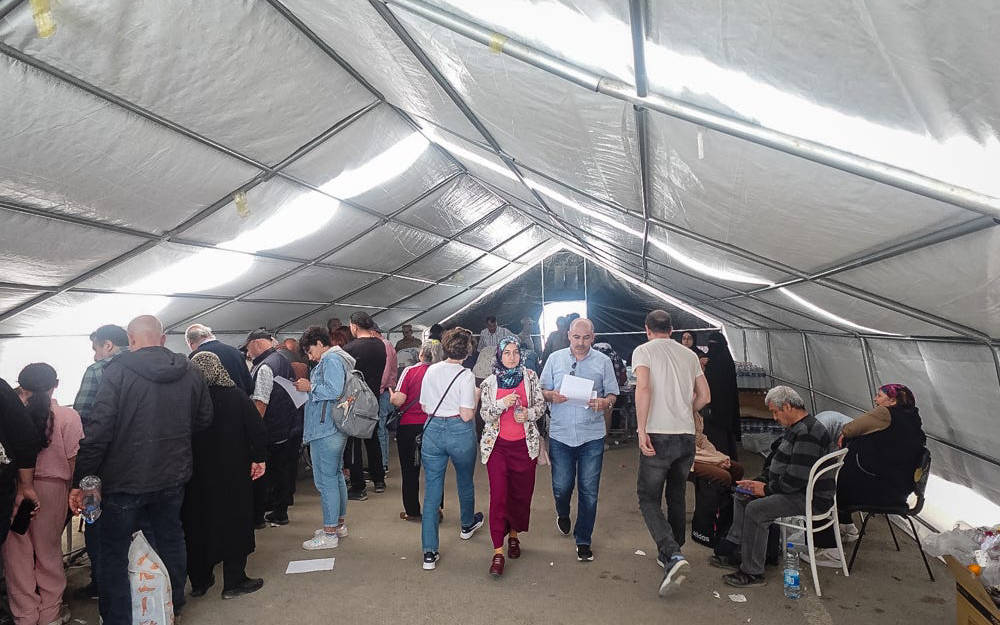Turning municipalities into something else


The President's words in Hatay, amidst the devastated buildings and desperate faces, were unsettling. However, we know that a politician as adept at understanding the people as Tayyip Erdoğan adjusts his words in the most effective way possible. It's possible that these words didn't disturb his loyal supporters; they might have even motivated them.
He precisely stated, "If the central government and local government don't work hand in hand, if they're not in solidarity, nothing good will come to that city. When has Hatay received anything?" With these words, he implied that he himself, who is responsible for bringing anything good to the city, knowingly admitted to not fulfilling that duty. Moreover, he knows that those he's addressing are aware of this as well. In fact, if anyone is unaware or has forgotten, he's reminding them to learn and remember.
The mayors of Hatay and İstanbul reacted to the President's words. Lütfü Savaş somewhat trivialized the issue by mentioning the French. Ekrem İmamoğlu, in his impactful speech, emphasized that these statements are a matter for medicine, requiring psychological analysis.
It's highly likely that Tayyip Erdoğan anticipated that these words would have a significant impact and lead to debates. He must have considered that these words would have repercussions not only in Hatay but also in all local administrations across the country. We can assume that many individuals, mayoral candidates, and bureaucrats are pondering over this issue.
There is nothing new
Actually, there's nothing new. Like in every matter, the President declares that he won't acknowledge any other administrator in the country besides himself. We can consider this as a continuation of his statement when he dismissed the Central Bank governor, saying, "He wasn't listening." Or his words regarding the Constitutional Court decision, "I don't comply, nor do I respect it."
Turkey was one of the most centralized countries in the world even before Tayyip Erdoğan. Local administrations were never allowed to be strong in the face of the center. Mayors not seeing themselves as ordinary public officials and not acting as such has always been uncomfortable in the eyes of the state.
The European Charter of Local Self-Government, adopted by the Republican People's Party (CHP) and previously by the Social Democratic Party (SHP), was labeled as a betrayal document by the Justice and Development Party (AKP). So much so that defending the agreement that European countries have been smoothly implementing since 1985 has become a political risk in itself.
This attitude reached its peak with the removal of HDP-led municipalities from their status as municipalities through the appointment of trustees and their transformation into state offices. Trustees were appointed to 48 municipalities, and the memberships of 1,139 municipal councilors were revoked. When the President's speech in Hatay is considered, one wonders what the voters in Diyarbakır, for example, thought.
Now is the time for all opposition parties to think beyond the March 31 elections, including the period after March 31. It's clear that the ruling bloc will try every method, as they did in the previous local elections, to win the elections. However, if they fail again, we shouldn't expect them to accept defeat.
It seems they are satisfied with the trustee model and have no intention of giving it up. We have seen them start with small experiments in almost every issue and gradually take more advanced steps over time. They will probably want to expand the trustee practice. If they lose the election in Hatay, the method they may resort to for central and local governments to work hand in hand could be appointing trustees.
It may not be limited to just Hatay. After all, if a municipality is seen only as a government office responsible for doing business and providing services, there could be grounds for the entire country to be governed by trustees.
From "politeia" to municipality.
However, before being a service unit, the municipality is the first step of democracy. In fact, it's not just democracy, but also the beginning of governance starts with the municipality. The word "municipality" is derived from the Arabic origin "balad-belde." "Belde" comes from the Ancient Greek word "politeia."
Plato's fundamental work reflecting the concept of state, politics, and even religion was translated into Turkish as "Devlet" (State). The original title of the book is "Politeia," derived from the word "polis," meaning city. Today, we use the word "municipality," derived from "politeia," which means state. The word "politics" also has the same root. Even the origin of the word demonstrates how intertwined municipality and politics.
In Europe, where strong centralized states did not exist for centuries, democracy began in municipalities. Cities, managed by local bourgeoisie and institutionalized over time, were established across the continent, each handling its own affairs. Anatolia, dominated by centralized empires like Byzantium and the Ottoman Empire, did not experience this. That's partly why each attempt at democracy in Turkey falls short.
In Turkey, municipalities gained strength during a period when relations with the European Union were improving, and efforts to join the Union were underway. The share of municipal expenditures in GDP remained around 1.0-1.5% until the 1990s. It rose to 3.5% in the second half of the 1990s and has continued at that level since. However, there is no longer any hope or intention regarding the European Union.
A government accustomed to absolute power, inclined towards absolute authority, will strive to prevent any power from remaining outside its control. The recent escalation in political rhetoric should also be seen as a sign of this trend. The indifference of most opposition parties to trustee appointments further strengthens this danger. (BD/HA/PE)






.jpg)
.jpg)
.jpg)
